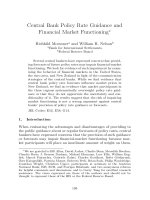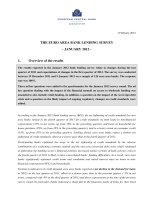Shigehara (ed ) the limits of surveillance and financial market failure; lessons from the euro area crisis (2014)
Bạn đang xem bản rút gọn của tài liệu. Xem và tải ngay bản đầy đủ của tài liệu tại đây (1.13 MB, 243 trang )
The Limits of Surveillance and Financial Market Failure
This page intentionally left blank
The Limits of Surveillance
and Financial Market
Failure
Lessons from the Euro-Area Crisis
Edited by
Kumiharu Shigehara
President, International Economic Policy Studies Association
Editorial matter, selection and introduction © Kumiharu Shigehara 2014
Individual chapters © Respective authors 2014
All rights reserved. No reproduction, copy or transmission of this
publication may be made without written permission.
No portion of this publication may be reproduced, copied or transmitted
save with written permission or in accordance with the provisions of the
Copyright, Designs and Patents Act 1988, or under the terms of any licence
permitting limited copying issued by the Copyright Licensing Agency,
Saffron House, 6–10 Kirby Street, London EC1N 8TS.
Any person who does any unauthorized act in relation to this publication
may be liable to criminal prosecution and civil claims for damages.
The authors have asserted their rights to be identified as the authors of this
work in accordance with the Copyright, Designs and Patents Act 1988.
First published 2014 by
PALGRAVE MACMILLAN
Palgrave Macmillan in the UK is an imprint of Macmillan Publishers Limited,
registered in England, company number 785998, of Houndmills, Basingstoke,
Hampshire RG21 6XS.
Palgrave Macmillan in the US is a division of St Martin’s Press LLC,
175 Fifth Avenue, New York, NY 10010.
Palgrave Macmillan is the global academic imprint of the above companies
and has companies and representatives throughout the world.
Palgrave® and Macmillan® are registered trademarks in the United States,
the United Kingdom, Europe and other countries.
ISBN 978–1–137–47146–8
This book is printed on paper suitable for recycling and made from fully
managed and sustained forest sources. Logging, pulping and manufacturing
processes are expected to conform to the environmental regulations of the
country of origin.
A catalogue record for this book is available from the British Library.
Library of Congress Cataloging-in-Publication Data
The limits of surveillance and financial market failure : lessons from the
Euro-area crisis / [edited by] Kumiharu Shigehara.
pages cm
Includes index.
ISBN 978–1–137–47146–8 (hardback)
1. Finance—European Union countries. 2. Financial crises—European
Union countries. 3. Monetary policy—European Union countries.
4. Eurozone. 5. European Union countries—Economic policy.
I. Shigehara, Kumiharu.
HG186.A2L56 2015
332 .0415094—dc23
2014028144
Dedicated to the memory of
Rutsu Shigehara
This page intentionally left blank
Contents
List of Tables and Figures
ix
Preface and Acknowledgements
x
Notes on Contributors
xiii
Part I
1 The Limits of Surveillance and Financial Market Failure:
Some Fundamental Issues Arising from the Euro-Area
Crisis
Kumiharu Shigehara
3
Part II
2 Global and Regional Surveillance: Lessons from the
Euro-Area Crisis
André Icard
3 Surveillance Failure or Systemic Failure?
Leif Pagrotsky
4 The Role of Surveillance: Lessons from the Euro-Area
Crisis
Val Koromzay
39
52
64
Part III
5 Beyond Surveillance: Reducing the Risk of Financial
Crises
Paul E. Atkinson
77
6 How Should Microprudential Control Be Strengthened
to Prevent Local and Global Financial Market Failure?
Jeffrey R. Shafer
88
7 Financial Market Failures and Their Remedies
Carol Sirou
vii
93
viii Contents
Part IV
8 On the Connection between Monetary Policy and the
Regulation of Banking and Financial Markets
Stephen H. Axilrod
9 Macroprudential Policy, Capital Controls and Bank
Systemic Risk
Adrian Blundell-Wignall and Caroline Roulet
10 Risk, Reward and Bank Resilience
Charles A.E. Goodhart
99
108
131
Part V
11 Can Europe Get Its Political Act Together? Alternative
Scenarios for the Eurozone
William R. White
12 More Effective Management of the Euro Area
Gunter D. Baer
143
163
Part VI
13 Executive Summary
Robert W.R. Price
173
14 Overview Report
Robert W.R. Price and Nicholas J. Vanston
180
Annex 1: Conference Programme
209
Annex 2: Contributors to the Conference
213
Index
216
Tables and Figures
Tables
9.1 Determinants of bank distance to default:
multivariate panel results
9.2 Correlations of model-identified variables and
monetary policy variables
14.1 Derivatives as a percentage of asset portfolios
116
118
190
Figures
9.1 India, Korea and China: interest differential,
forward/spot and covered interest parity
14.1 Changes in unit labour costs
14.2 Current account balances
14.3 Ten-year government bond spread
14.4 Risk-weighted assets as a share of total assets
14.5 Net international investment positions
14.6 General government gross debt ratio
14.7 General government primary balances
14.8 Unemployment rate
ix
122
184
185
187
189
203
204
205
207
Preface and Acknowledgements
The euro-area crisis, which erupted only a few years after the outbreak of the global financial and economic crisis originating from the
US housing market debacle, revealed weaknesses in regional as well
as global frameworks for financial and economic crisis prevention.
In fact, neither regional surveillance within the European framework nor global surveillance by international institutions such as
the International Monetary Fund and the Organisation for Economic
Co-operation and Development (OECD) was effective in preventing
such large-scale crises in developed countries. Can more effective
surveillance be put in place to prevent their recurrence?
In addition to limits to effective surveillance, the repeated financial
crises in developed OECD countries have shed light on deficiencies in
the current prudential and monetary policy frameworks which were
designed to secure financial market stability and minimize economywide disturbances arising from financial market imbalances while
maintaining general price stability. How should prudential regulations be strengthened? How should the “herd instinct” of financial
institutions leading to financial market instability and the problems
of moral hazard and regulatory and supervisory “capture” by large
financial institutions be dealt with?
What are the implications of these problems for better management of the euro area? How can member countries meet the
challenges of adapting their macroeconomic, financial and structural policy frameworks required to run a single-currency area properly? How can they overcome political economy issues involved in
running such an area?
This book deals with this range of difficult policy issues of our time.
After the stage setting for discussion of these in Part I, Part II offers
two contrasting views of the direction of and scope for future surveillance. One view is that surveillance should be comprehensive and
cover all macroeconomic and financial aspects. An alternative view
is that even strengthened surveillance would not have prevented
the crisis in the euro area. Therefore we need to accept that the
effectiveness of surveillance is limited by governments which impose
x
Preface and Acknowledgements
xi
restraints on surveillance by international institutions in their “shareholding” capacity, as well as by self-restraint by the institutions.
Elected governments are often reluctant to face up to the implications
of warnings and alerts by international institutions if these could be
politically unattractive.
Part III goes beyond surveillance and builds on the view that
microprudential control needs to be strengthened to prevent financial market failure, both globally and in the European context. Since
supervisors are subject to many of the same forces that limit the effectiveness of surveillance, contributors to this part focus on the need
to strengthen regulatory frameworks and to make market processes
work better. Key issues include capital adequacy, the desirability
of separating many investment banking activities (notably those
involving large derivative portfolios) from commercial banking, liquidity, governance to limit moral hazard and ways to ensure greater
comparability and transparency of information disseminated to the
markets.
Part IV discusses the combined use of macroprudential and monetary policies to secure financial market stability and minimize
economy-wide disturbances. It addresses the issue of achieving
an operational integration of monetary and regulatory policies in
Europe where institutions are decentralized, noting that even within
an individual country the monetary policy authorities and the banking and security regulators often have different policy orientations.
A specific issue discussed in this context relates to banks’ attempts to
offset changes in macroprudential policy by changing the riskiness of
their portfolios in other ways. Given the need to ease the task of better coordination of supervisory policies, a scheme is proposed to put
less pressure on the regulations and to apply more pressure on measures to influence the incentives facing bank managers with respect
to risk-taking.
In the light of discussions of these issues, not only in the context of the euro area but also with a broader global perspective, Part
V turns to the specific issue of how the euro area should be managed to contain, and prevent, the future re-emergence of excessive
intraregional imbalances leading to crises. In this part, the root cause
of the euro-area crisis is revealed as the balance of payments disequilibria associated with the build-up of unsustainable debts, both
public and private, in several member countries where excessive
xii Preface and Acknowledgements
credit expansion was caused by the lack of monetary policy independence in the single currency area. It examines various efforts to
reduce balance of payments imbalances and the respective roles of
debtor and creditor countries in the area, and it points to the importance of flexible nominal wages and prices, and movements of labour
in order to return to a sustainable equilibrium.
Part VI provides both an executive summary and a fuller report
about oral discussions concerning these topical issues that took place
among paper authors, preassigned discussants and other participants
in the international conference entitled “The Limits of Surveillance
and Financial Market Failure: Lessons from the Euro-Area Crisis”,
which was held in Paris on 23 September 2013. The event gathered
first-class economists with rich experience in domestic and international economic and financial policy-making, as well as policy
advisory work, in Europe, the USA and Japan, and aimed at in-depth
discussion of these fundamental issues of our time with a view to
finding ways for better management of the euro area and the global
economy more generally. The programme of the conference and the
list of contributors to it are given in the annexes.
The conference was initiated as a non-bipartisan, non-political voluntary activity by me as president of the International Economic
Policy Studies Association. Special thanks are due to Robert Raymond,
advisor to the association and treasurer of La Maison de l’Europe de
Paris, whose assistance enabled me to hold the conference at a magnificent hall in the premises of La Maison de l’Europe de Paris in the
heart of the French capital.
For the publication of this book, I received invaluable assistance
from Paul Atkinson, executive director of the association. I am
also indebted to Aimee Dibbens, Commissioning Editor, Palgrave
Macmillan, and Kate Boothby, Copy Editor, for their extensive help.
Kumiharu Shigehara
Tokyo, 31 May 2014
Contributors
Paul E. Atkinson Executive Director and Senior Fellow of the International Economic Policy Studies Association. Former Deputy Director of the Directorate for Science, Technology and Industry at the
OECD. Former editor of OECD Economic Outlook.
Stephen H. Axilrod Consultant on policy and markets. Former Staff
Director for monetary and financial policy at the board of governors of the Federal Reserve System and Staff Director and Secretary
of the Federal Open Market Committee. Also, former Vice-Chairman
of Nikko Securities Co. International, headquartered in New York.
Author of Inside the Fed: Monetary Policy and Its Management: Martin
through Greenspan to Bernanke, revised edition (2011) and The Federal
Reserve: What Everyone Needs to Know (2013).
Gunter D. Baer Former Secretary General of the Bank for International Settlements (BIS). Former Secretary General of the Committee
of Governors of the EEC central banks. Rapporteur, together with the
late Tommaso Padoa-Schioppa, of the Delors Committee.
Adrian Blundell-Wignall Special Advisor to the Secretary-General
on Financial Markets and Director of the Directorate for Financial
and Enterprise Affairs at the OECD.
Charles A.E. Goodhart Professor Emeritus and member of the Financial Market Group at the London School of Economics. Former member of the Bank of England’s Monetary Policy Committee. Developer
of Goodhart law, an economic law named after him.
André Icard Member of the Enforcement Committee of the French
Prudential Supervision and Resolution Authority. Former Deputy
General Manager of the BIS. Former Directeur Général des Etudes at
the Banque de France. Co-editor, together with Jack Boormann, of
the final report on the reform of the international monetary system
xiii
xiv Notes on Contributors
prepared by the Palais Royal group initiated by Michel Camdessus,
Alexandre Lamfalussy and the late Tommaso Padoa-Schioppa.
Val Koromzay Former Director of the Country Studies Branch of the
Economic Department of the OECD.
Leif Pagrotsky Former member of the cabinet of the Swedish government, former Minister of Industry and Trade and former Minister
of Education, Research and Culture. Former Vice Chairman of the
General Council of the Riksbank.
Robert W.R. Price Senior Fellow of the International Policy Studies
Association. Former Head of the Monetary and Fiscal Policy Division;
General Economic Analysis Division; and Country Studies Division
II in the OECD Economics Department. Former editor of OECD
Economic Outlook.
Caroline Roulet Economist, Directorate for Financial and Enterprise
Affairs at the OECD.
Jeffrey R. Shafer Consultant. Former Vice Chairman of Citigroup
Global Markets. Former Undersecretary of the US Treasury for International Affairs. Former staff official of the OECD and the Federal
Reserve (board of governors and NewYork Bank).
Kumiharu Shigehara President of the International Economic Policy
Studies Association. Former Chief Economist and Deputy SecretaryGeneral of the OECD. Former Chief Economist and Director-General
of the Institute for Monetary and Economic Studies of the Bank of
Japan.
Carol Sirou President of Standard & Poor’s Credit Market Services,
France.
Nicholas J. Vanston Senior Fellow of the International Policy Studies Association. Former Head of the Country Studies II Division;
Structural Policy Analysis Division; and Foreign Trade and Payments
Division in the OECD Economics Department.
Notes on Contributors
xv
William R. White Chair, the Economic and Development Review
Committee of the OECD. Former Economic Adviser and Head of
the Monetary and Economic Department of the BIS. Former Deputy
Governor of the Bank of Canada.
This page intentionally left blank
Part I
This page intentionally left blank
1
The Limits of Surveillance and
Financial Market Failure: Some
Fundamental Issues Arising from
the Euro-Area Crisis
Kumiharu Shigehara
Just a few years after the outbreak of the global financial and economic crisis which originated from the US housing market debacle,
another financial crisis erupted in the OECD area, this time in the
euro area. It was triggered by a sudden loss of market confidence
in the sustainability of Greek government debt finance. The crisis
soon spread to Ireland and Portugal,1 and, by the middle of 2011,
Spain and Italy were affected by mounting market concern about
their sovereign debt. Unlike Greece, several of the latter countries
had over the years maintained general government net financial
balances in a better form than other member countries, such as
Germany and France, which have not suffered from acute financial
market stress. But in many of them, private-sector saving shortages relative to domestic investment were covered over years by
capital inflows from abroad to match persistent current account
deficits.
A principal underlying cause of the external deficits was nominal
wage increases far above labour productivity growth and the resulting inflation of unit labour costs leading to a significant erosion of
competitiveness against trading partners and, in particular, Germany.
In some of these countries, notably Ireland and Spain, the accumulation of the household/corporate sector debt was associated with
housing market bubbles. After the burst of these bubbles, the real as
well as the perceived need for an injection of public funds to reinforce
3
4
The Limits of Surveillance and Financial Market Failure
the capital base of unsound banks, as well as to protect bank depositors, started to erode the soundness of public finance, and strain
suddenly developed in their government debt financing. In fact,
financial market participants started to discriminate across euro-area
sovereign bonds only from around the second half of 2008, following the financial market turmoil that erupted in the USA around
mid-2007.
Why was the crisis in the euro area not anticipated in time to
prevent it?
While the detailed records of regional surveillance conducted
before the outbreak of the euro-area crisis within the frameworks
of the European Community and euro-area based institutions are
not accessible to outside observers, the European Central Bank (ECB)
publicly acknowledged that, in addition to the lack of rigorous
implementation of the Stability and Growth Pact, “the economic
governance framework was also unable to prevent the emergence
of excessive macroeconomic imbalances in the euro area” under the
heading “The Lack of Macroeconomic Surveillance” in the section
entitled “Economic Governance in the Euro Area – Why a Quantum
Leap Is Required” in the article “The Reform of Economic Governance in the Euro Area – Essential Elements” (Monthly Bulletin March
2011).2
Besides regional institutions engaged in surveillance of the euro
area, the International Monetary Fund (IMF) as a principal global
institution has been in charge of the surveillance of individual member countries and the euro area as a whole so as to ensure global
financial stability and the promotion of economic growth.3
My review of the back numbers of the IMF flagship publication
World Economic Outlook (WEO) conveys the impression that the IMF’s
early warning function in the run-up to the euro-area crisis was not
satisfactory (see Appendix 1). A far more systematic post mortem was
conducted by Pisani-Ferry et al. and the result was reported in The
2011 TSR Study – An Evaluation of IMF Surveillance of the Euro Area, in
which they noted:
In general IMF surveillance failed to take fully into account the
implications of being in a currency union both for national policies and for the governance of the euro area, whose weaknesses
were not fundamentally criticized.4
Kumiharu Shigehara
5
Another international institution which has been engaged in the
surveillance of individual member countries and the euro area is the
OECD. Unlike at the IMF, a systematic exercise by outside experts
to review the OECD’s (published and unpublished) documents for
surveillance on euro-area member countries and the area as a whole
have not been carried out at the OECD. However, my review of the
back numbers of its flagship publication, Economic Outlook (EO), since
2000 suggests that the OECD issued warnings about some emerging
fundamental problems in several euro-area member countries at a
fairly early stage (see Appendix 1). For example, in the December
2001 EO, the erosion of Italy’s competitive position was discussed as a
matter of the OECD’s particular concern in the country note on Italy
(p.67). In the subsequent issues of EO, the evolution of Italy’s competitiveness and related policy issues regularly featured the country
notes, with particular attention paid to divergent developments in
relative unit labour costs.
However, such warnings were ignored by national policy-makers.
As a matter of fact, the correction of imbalances in the euro area
was set in motion essentially under financial market pressures which
forced deficit countries to adopt fiscal consolidation5 as well as
through the market-induced financial deleveraging of the private
sector in these countries, pointing to the importance of financial
market discipline which unfortunately started to play its role with
a long delay and too abruptly. The resultant contraction of domestic demand in the deficit countries has been a main cause of their
wage and price deflation and current account improvements. Euroarea surplus countries’ contribution6 has so far basically been limited
to financial assistance through existing and new European facilities7 together with IMF loans.8 Faster domestic demand expansion
in surplus countries should facilitate intra-euro-area current account
adjustment processes and the narrowing of differentials in cost and
price competitiveness in the euro area, but it has not been taking
place under single monetary policy geared to the objective of maintaining area-wide inflation “below but close to 2 percent”. There is
a view that the ECB should raise its inflation objective to a higher
rate,9 but it is not clear that such a policy will be helpful. The IMF
view on this point is not very clear.10 Its recommendation regarding the role of structural policies in Germany appears to be more
convincing,11 but its effects may require time before they start to
6
The Limits of Surveillance and Financial Market Failure
visibly attenuate the economic and social costs of adjustment in
deficit countries.12
Immediately after the start of European monetary union (EMU),
issues arising from divergent cyclical positions in individual euroarea member countries out of line with its common monetary policy
were discussed in some detail in a special section about the European
Union (EU) of the EO June 2001 issue.13 The OECD argued there:
If fiscal policy does not play a stabilizing role, the unwinding
of excess demand is by default left to market forces. Ireland,
the Netherland and Spain are already experiencing much faster
growth in unit labour costs in the total economy than other
members of the monetary union, and this loss in competitiveness
vis-à-vis their euro partners is likely to persist in the coming years.
The eventual gradual weakening of net external balance will act
to reduce the extent of the overheating, though this might take a
relatively long time. While this “gold standard” type adjustment
mechanism will ultimately prove effective, it will inevitably result
in important structural changes in the economies affected, notably
the allocation of resources away from their traded goods sectors.
This will require the institutional structure in the smaller countries
to be efficient in reallocating resources from declining to growing sectors. Reliance on market forces to deal with overheating
thus call for reforms in product and labour markets to increase the
capacity of the economy to adjust smoothly to changed circumstances. Furthermore, there is a possibility that real interest rates
shaped by area-wide nominal rates and high domestic inflation
will result in excessive credit expansion, leading to unsustainable
increases in property values and in investment and capital stocks.
This points to a risk of balance sheet problems in the wake of overheating. Supervisory policies need to ensure that financial systems
maintain diversified portfolios and strong capital bases so as to be
resilient as overheating ends.14
However, the records of national and international bank supervisors
since the publication of the EO of June 2001 show that they were
behind the curve. Are there reasons for believing that they will do a
good job next time?
Kumiharu Shigehara
7
Moreover, one cannot be optimistic about the effectiveness of
surveillance at the global level by the IMF and the OECD15 as well
as at the regional level (within the frameworks of the euro area
and the European Community in the case of the current crisis in
Europe)16 given political reality in individual nations.17 In the end
it may continue to be financial market forces which oblige national
policy-makers to adopt adjustment policy measures which are necessary but disliked by electorates. This raises the question of how
to make financial markets more forward-looking to prevent abrupt
changes in market conditions and the disruption of real economic
activities.
With this issue in mind, efforts have been strengthened over the
years to facilitate the diffusion of surveillance documents by international institutions, at a remarkable pace at the IMF, though much
less so at the OECD. However, published versions of their warnings are “sanitized” and as such are sometimes not considered to
be fully reliable and credible by the financial markets.18 On the
other hand, any strong messages from public institutions, particularly from those that are directly engaged in policy-making (such
as the ECB),19 involve the risk of upsetting the financial markets
and adding to their volatility. The balancing act here is extremely
difficult.
A lesson learnt from a series of crises in Latin America since the
early1980s and the Asian crisis in the late 1990s was that efforts
should be strengthened to improve statistical information about
debtor countries in the non-OECD area and its dissemination to
financial market participants and the outside world more generally.
However, the global financial crisis of 2007–2009 originated in the
USA, where data on household debt and other data are fully available
to financial market participants. Statistics not just on fiscal deficits
but on external imbalances and such underlying determinants of
imbalances as cost and inflation divergences among euro-area member countries have also been readily obtainable by financial market
participants.
Why were these data regarding underlying imbalances across
euro-area member countries developing over so many years after
the start of the euro not properly reflected in market prices of
their euro-denominated government debt instruments? Were there
8
The Limits of Surveillance and Financial Market Failure
reasons for financial market participants to believe that emerging problem countries in the euro area would be bailed out in
one way or another without losses on their part? What was
the significance of the “no bail-out” clause of the Maastricht
Treaty?20
It is true that banks are allowed to attach a zero-risk weight
to sovereign debt under the standardized approach of Basel II,
which was carried over into Basel III. Moreover, while the internal ratings-based approach within the Basel II framework did try
to encourage large and sophisticated banks to be more discriminating in their sovereign exposures, the EU’s Capital Requirements Directives introduced a generalized zero-risk weight for all
EU central government debt denominated and funded in domestic
currency.21
That said, market prices should have been differentiated if markets had perceived that countries with unsustainable fiscal positions
would not be bailed out and private investors would be forced to
incur losses.22
Another issue relates to differentials for nominal interest rates on
private-sector debt which is not subjected to the zero-risk weighting
under the standardized approach of Basel arrangements nor covered by the EU’s Capital Requirements Directives. Why did they
remain narrow among euro-area countries despite inflation differentials among them, thus distorting financial resource allocation
within the euro area for an extended period? The two financial
crises originating in the OECD area suggest that sufficient statistical
information flows will not guarantee the good functioning of OECD
financial markets if they are left to function with their inherent
dynamics.23
There is a saying in Japan that “There is no risk in crossing a road
if you are walking in a group.” Will the use of public funds in bailing out troubled banks and protecting depositors and institutional
investors that has taken place, and is likely to continue, to deal with
the current euro-area crisis induce new episodes of herd behaviour on
the part of financial market participants?24
Do these observations made and the questions raised here imply
that financial crises are bound to happen again in the OECD area
as well as in the rest of the world in the future? Should we remain
resigned?









